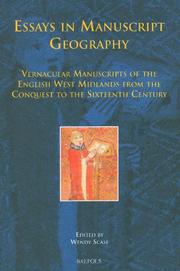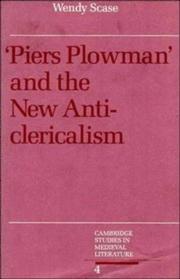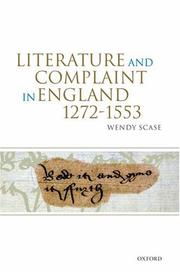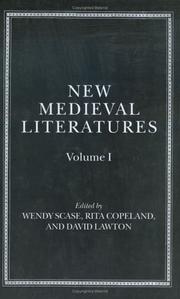| Listing 1 - 10 of 25 | << page >> |
Sort by
|

ISBN: 9782503516950 2503516955 9782503538921 Year: 2007 Volume: 10 Publisher: Turnhout: Brepols,
Abstract | Keywords | Export | Availability | Bookmark
 Loading...
Loading...Choose an application
- Reference Manager
- EndNote
- RefWorks (Direct export to RefWorks)
The medieval English West Midlands has long been associated with the production of vernacular texts, in Old and Middle English, and with the making of several famous manuscripts. The aim of this volume is to re-think assumptions about medieval literature and the region in the light of new research in medieval book history. A series of specially commissioned essays in ‘manuscript geography’ examines the making and use of texts and books in relation to cultural networks in the region and beyond. Included are case studies of manuscripts of Worcester and the Worcester diocese from the eleventh to the thirteenth centuries; investigations of manuscript production in fourteenth-century Shropshire and its wider regional links; and essays on textual cultures in Warwickshire from the activities of the aristocrats and gentry of the fifteenth and sixteenth centuries to the projects of later antiquarians. Essays in the final section of the volume reflect on the possibilities of large-scale, corpus-based research on medieval manuscript books. Collectively the essays identify and explore some of the investments of traditional regionalist accounts of vernacular literary culture and model new theoretical and methodological approaches.
Manuscripts, English (Middle) --- Manuscripts, English (Old) --- Manuscripts, English --- Manuscripts, Medieval --- Books --- Books and reading --- Manuscript preparation (Authorship) --- History. --- History --- British Library. --- West Midlands (England) --- Intellectual life. --- 091 <41> --- Handschriftenkunde. Handschriftencatalogi--Verenigd Koninkrijk van Groot-Brittannië en Noord-Ierland --- 091 <41> Handschriftenkunde. Handschriftencatalogi--Verenigd Koninkrijk van Groot-Brittannië en Noord-Ierland --- Medieval manuscripts --- Manuscripts --- English manuscripts --- Anglo-Saxon manuscripts --- English manuscripts, Old --- Manuscripts, Anglo-Saxon --- Manuscripts, Old English --- Old English manuscripts --- English manuscripts (Middle) --- Manuscripts, Middle English --- Middle English manuscripts --- Preparation of manuscripts (Authorship) --- Authorship --- Editing --- Printing --- Word processing --- Library materials --- Publications --- Bibliography --- Cataloging --- International Standard Book Numbers --- Appraisal of books --- Choice of books --- Evaluation of literature --- Literature --- Reading, Choice of --- Reading and books --- Reading habits --- Reading public --- Reading --- Reading interests --- Reading promotion --- Appraisal --- Evaluation --- British Museum. --- West Midlands, Eng. --- West Midlands (England : Metropolitan County) --- West Midlands (England : Region) --- West Midlands County (England) --- County of West Midlands (England) --- West Midlands Region (England) --- Herefordshire (England) --- Shropshire (England) --- Staffordshire (England) --- Worcestershire (England) --- Warwickshire (England) --- England --- West Midlands --- Manuscripts [English ] (Middle) --- Manuscripts [English ] (Old) --- Manuscripts [Medieval ] --- Intellectual life --- English language --- books --- manuscripts [documents] --- history [discipline] --- anno 1000-1099 --- anno 1200-1499 --- anno 1100-1199 --- West Midlands [region] --- Art --- Manuscripts. Epigraphy. Paleography --- Manuscripts, English (Middle) - England - West Midlands - History. --- Manuscripts, English (Old) - England - West Midlands - History. --- Manuscripts, English - History - To 1500. --- Manuscripts, Medieval - England - History. --- Manuscripts, Medieval - England - West Midlands - History. --- Books - England - History - 400-1450. --- Books and reading - England - West Midlands - History. --- Books and reading - England - History - To 1500. --- Manuscript preparation (Authorship) - England - West Midlands - History. --- West Midlands (England) - Intellectual life.

ISBN: 052136017X 0521044545 0511553021 9780521360173 9780511553028 9780521044547 Year: 1989 Volume: 4 Publisher: Cambridge Cambridge University Press
Abstract | Keywords | Export | Availability | Bookmark
 Loading...
Loading...Choose an application
- Reference Manager
- EndNote
- RefWorks (Direct export to RefWorks)
The medieval English poem Piers Plowman is noted for its attacks on the clergy. The later fourteenth century, when the poem was written, is often thought of as an anticlerical age. This book is an extended investigation of the anticlericalism of the poem. Dr Scase challenges the usual assumption that long-established anticlerical traditions continued unchanged in the conflicts of this period. She describes and analyses important but little-known medieval polemics and satires (many of them only available in manuscript), tracing the emergence of a distinctive 'new anticlericalism' which entailed nothing less than the making of a new anticlerical literature. With the writing of Piers Plowman, she argues, this literary challenge was accepted. Always referring closely to the contemporary controversies, and with constant attention to the detail of the text, she reveals the significance of the poem's anticlericalism. Informative and rigorously argued, this book is intended to convince literary critics and historians alike.
Christian poetry, English (Middle) --- Church history --- Anti-clericalism --- Clergy in literature. --- History and criticism. --- History. --- 27 <420> "13" --- -Clergy in literature --- -Church history --- -Christianity --- Ecclesiastical history --- History, Church --- History, Ecclesiastical --- History --- Christianity --- Church and state --- Clergy --- Clericalism --- Kerkgeschiedenis--Engeland--?"13" --- History and criticism --- Langland, William --- England --- -27 <420> "13" --- -Kerkgeschiedenis--Engeland--?"13" --- -Christian poetry, English (Middle) --- -Anti-clericalism --- Clergy in literature --- Middle Ages, 600-1500 --- Langland, William, --- Arts and Humanities --- Literature --- Christian poetry, English (Middle) - History and criticism. --- Church history - Middle Ages, 600-1500. --- Anti-clericalism - England - History.

ISBN: 9780199270859 0199270856 9786611164447 1281164445 0191533785 9780191533785 9781281164445 6611164448 138304144X Year: 2007 Publisher: Oxford New York Oxford University Press
Abstract | Keywords | Export | Availability | Bookmark
 Loading...
Loading...Choose an application
- Reference Manager
- EndNote
- RefWorks (Direct export to RefWorks)
Giving a different perspective on the relations between early judicial process & the development of literature in England, this book argues that texts ranging from political libels & pamphlets to laments of the unrequited lover constitute a literature shaped by the crucial role of complaint in the law courts.
Complaints (Rhetoric) --- English literature --- Law and literature --- Law in literature. --- Narration (Rhetoric) --- History and criticism. --- History --- Complaints (Rhetoric). --- Law in literature --- Complaining (Rhetoric) --- Literature and law --- History and criticism --- Rhetoric --- Literature --- Discourse analysis, Narrative --- Narratees (Rhetoric) --- Littérature anglaise --- Complaintes anglaises --- Réclamations (procédure administrative) --- 1100-1500 (moyen anglais) --- 16e siècle --- Histoire et critique --- Grande-Bretagne --- Moyen-Âge
Book
Year: 1992
Abstract | Keywords | Export | Availability | Bookmark
 Loading...
Loading...Choose an application
- Reference Manager
- EndNote
- RefWorks (Direct export to RefWorks)
Book
ISBN: 9782503530468 Year: 2013 Volume: 6 Publisher: Turnhout Brepols
Abstract | Keywords | Export | Availability | Bookmark
 Loading...
Loading...Choose an application
- Reference Manager
- EndNote
- RefWorks (Direct export to RefWorks)
Book history --- Manuscripts. Epigraphy. Paleography --- Old English literature --- 091.31 "13" --- 091 <41 OXFORD> --- 091:003.5 --- Verluchte handschriften--14e eeuw. Periode 1300-1399 --- Handschriftenkunde. Handschriftencatalogi--Verenigd Koninkrijk van Groot-Brittannië en Noord-Ierland--OXFORD --- Handschriftenkunde. Handschriftencatalogi-:-Schrijfmaterialen --- 091:003.5 Handschriftenkunde. Handschriftencatalogi-:-Schrijfmaterialen --- 091 <41 OXFORD> Handschriftenkunde. Handschriftencatalogi--Verenigd Koninkrijk van Groot-Brittannië en Noord-Ierland--OXFORD --- 091.31 "13" Verluchte handschriften--14e eeuw. Periode 1300-1399 --- Didactic literature [English ] (Middle) --- History and criticism --- Congresses --- Manuscripts --- Editing --- History --- To 1500 --- Literary patrons --- England --- Bodleian Library Oxford. Manuscript. Eng. poet. a. 1 --- Manuscripts [English ] (Middle) --- Manuscripts [Medieval ] --- Illumination of books and manuscripts [English ] --- Illumination of books and manuscripts [Medieval ] --- Christian literature [English ] (Middle)
Book
ISBN: 9782503598420 2503598420 9782503598437 Year: 2022 Publisher: Turnhout Brepols
Abstract | Keywords | Export | Availability | Bookmark
 Loading...
Loading...Choose an application
- Reference Manager
- EndNote
- RefWorks (Direct export to RefWorks)
Visible English recovers for the first time the experience of reading and writing the English language in the medieval period through the perspectives of littera pedagogy, the basis of medieval learning and teaching of literate skills in Latin. Littera is at the heart of the set of theories and practices that constitute the ‘graphic culture’ of the book’s title. The book shows for the first time that littera pedagogy was an ‘us and them’ discourse that functioned as a vehicle for identity formation. Using littera pedagogy as a framework for understanding the medieval English-language corpus from the point of view of the readers and writers who produced it, Visible English offers new insights on experiences of writing and reading English in communities ranging from those first in contact with Latin literacy to those where print was an alternative to manuscript. Discussing a broad range of materials from so-called ‘pen-trials’ and graffiti to key literary manuscripts, Visible English provides new perspectives on the ways that the alphabet was understood, on genres such as alphabet poems, riddles, and scribal signatures, and on the different ways in which scribes copied Old and Middle English texts. It argues that the graphic culture underpinned and transmitted by littera pedagogy provided frameworks for the development and understanding of English-language literacy practices and new ways of experiencing social belonging and difference. To be literate in English, it proposes, was to inhabit identities marked by Anglophone literate practices.
English language --- Literacy --- Usage. --- Alphabet. --- Writing. --- History. --- 091 =20 --- 091.14 --- 028 --- 028 Lezen. Lectuur --- Lezen. Lectuur --- 091.14 Codicologie. Codices. Scriptoria --- Codicologie. Codices. Scriptoria --- 091 =20 Handschriftenkunde. Handschriftencatalogi--Engels --- Handschriftenkunde. Handschriftencatalogi--Engels
Book
ISBN: 9781851243334 Year: 2011 Publisher: Oxford Bodleian library
Abstract | Keywords | Export | Availability | Bookmark
 Loading...
Loading...Choose an application
- Reference Manager
- EndNote
- RefWorks (Direct export to RefWorks)

ISBN: 0198183895 Year: 1997 Publisher: Oxford : Clarendon press,
Abstract | Keywords | Export | Availability | Bookmark
 Loading...
Loading...Choose an application
- Reference Manager
- EndNote
- RefWorks (Direct export to RefWorks)
Book
ISBN: 1782047395 1843844338 Year: 2016 Publisher: Cambridge : D.S. Brewer,
Abstract | Keywords | Export | Availability | Bookmark
 Loading...
Loading...Choose an application
- Reference Manager
- EndNote
- RefWorks (Direct export to RefWorks)
New Medieval Literatures - now published by Boydell and Brewer - is an annual of work on medieval textual cultures, aiming to engage with intellectual and cultural pluralism in the Middle Agesand now. Its scope is inclusive of work across the theoretical, archival, philological, and historicist methodologies associated with medieval literary studies, and embraces both the British Isles and Europe.
Topics in this volume include the political ecology of Havelok the Dane: Thomas Hoccleve and the making of "Chaucer"; and Britain and the Welsh Marches in Fouke le Fitz Waryn.
Contributors: Alexis Kellner Becker, Emily Dolmans, Marcel Elias, Philip Knox, Sebastian Langdell, Jonathan Morton, Marco Nievergelt, George Younge.
Literature, Medieval --- European literature --- Medieval literature --- History and criticism --- History and criticism.
Book
ISBN: 178204941X 1843844575 Year: 2017 Publisher: Cambridge : D. S. Brewer,
Abstract | Keywords | Export | Availability | Bookmark
 Loading...
Loading...Choose an application
- Reference Manager
- EndNote
- RefWorks (Direct export to RefWorks)
New Medieval Literatures is an annual of work on medieval textual cultures, aiming to engage with intellectual and cultural pluralism in the Middle Ages and now. Its scope is inclusive of workacross the theoretical, archival, philological, and historicist methodologies associated with medieval literary studies, and embraces both the British Isles and Europe.
Essays in this volume engage with the relations between humans and nonhumans; the power of inanimate objects to animate humans and texts; literary deployments of medical, aesthetic, and economic discourses; the language of friendship; and the surprising value of early readers' casual annotations. Texts discussed include Beowulf, works by Rolle, Chaucer, Langland, Gower, and Lydgate; lyrics of the Occitan troubadourMarcabru and the French poet Richard de Fournival; and the Anglo-Saxon versions of Boethius's De Consolatione Philosophiae and Augustine's Soliloquia.
Wendy Scase is Geoffrey Shepherd Professor of Medieval English Literature at the University of Birmingham; David Lawton is Professor of English at Washington University, St Louis; Laura Ashe is Associate Professor of English at Worcester College, Oxford.
Contributors: Diane Cady, Aaron Hostetter, Boyda Johnstone, R. Jacob McDonie, Michael Raby, Joe Stadolnik, Spencer Strub, Eliza Zingesser.
Medievalism --- Civilization, Medieval --- Middle Ages --- Literature, Medieval --- History and criticism.
| Listing 1 - 10 of 25 | << page >> |
Sort by
|

 Search
Search Feedback
Feedback About UniCat
About UniCat  Help
Help News
News